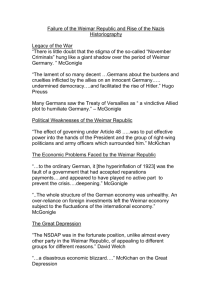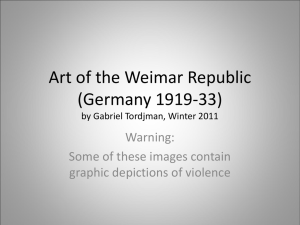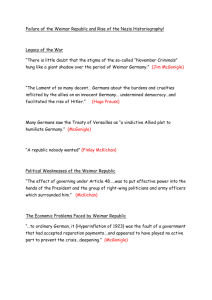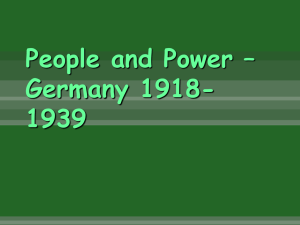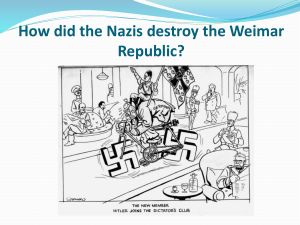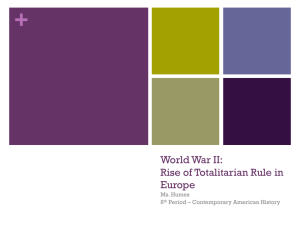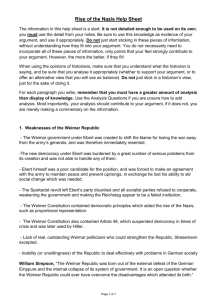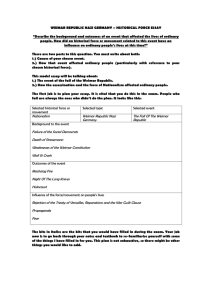Germany 1918-1939 Fall of the Wiemar Republic.doc
advertisement
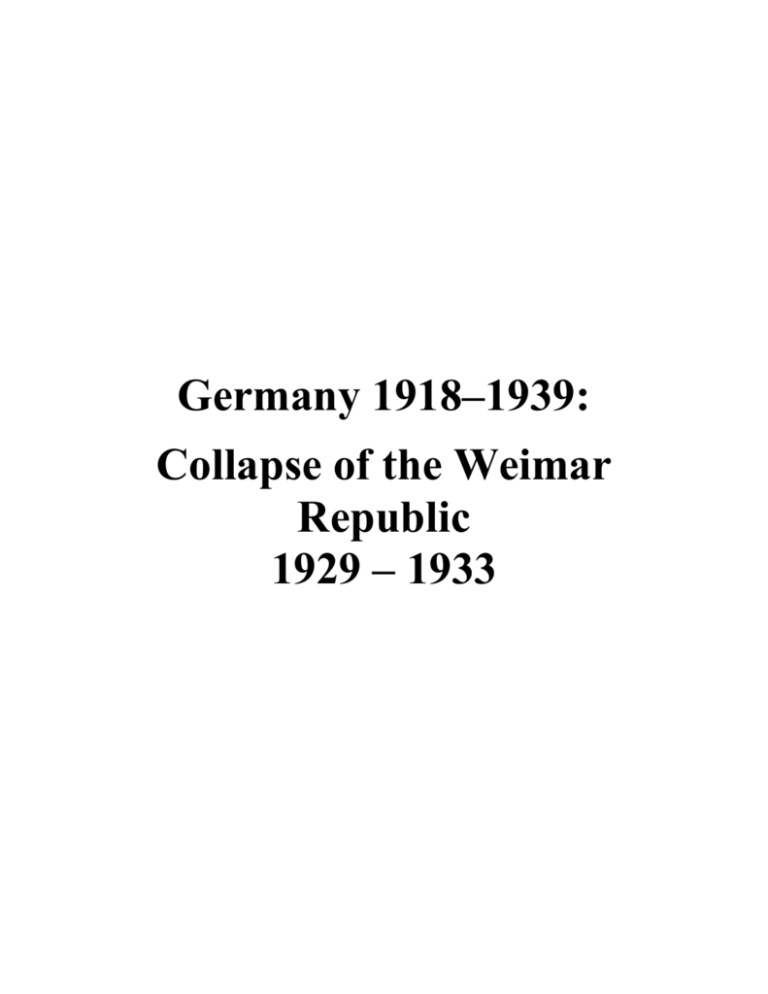
Germany 1918–1939: Collapse of the Weimar Republic 1929 – 1933 The collapse of the Weimar Republic and the subsequent take over by Adolf Hitler in 1933 was influenced by a wide range of factors. The following points need to be considered when discussing the fall of the Republic and the rise of the Nazi state. Political, economic and social issues and the collapse of the Weimar Republic 1. The Revolution of 1918 had altered Germany's political system without changing the social structure. The monarchy had been destroyed, but many of the old institutions were little changed. If the Republic was to survive, there had to be drastic changes to the old institutions. The parties of the Weimar failed to do this. For example: o The civil service, which was the instrument for implementing government policy, retained a high proportion of its personnel. Members were in a position to guide policy making or obstruct policies with which they did not agree. o The judiciary, which had a conservative and nationalistic outlook, remained intact. Hence the lenient sentences given to right wing enemies of the Republic (e.g. Hitler and Ludendorff in 1923) and harsh sentences to left wing communist enemies. o Education administrators and teachers who were hostile to democracy were permitted to remain in their positions. Many used these positions to indoctrinate students with nationalist, authoritarian and anti-republican principles. o The great industrialists were permitted to grow in strength and influence. Their manoeuvres played a considerable part in the overthrow of the Republic. o The army was responsible to the President and stood largely outside political control, but it was in a position to exert influence on political questions. The Weimar leaders were forced to call upon the army to sustain the Republic against attack and were also forced to introduce policies with which the army agreed. 2. The Presidential elections of 1925 resulted in the defeat of the Social Democrat candidate and the election of Hindenburg. At the age of 77 he was elected to head the Republic for which he had little sympathy. He was a loyal servant of the Republic, but as he declined into near senility, his presidential powers were exploited by less scrupulous, anti-republicans. The very election of a person such as Hindenburg indicated that the people's attachment to a democratic, republican government was only superficial. 3. The character of the Social Democratic Party was important; its leaders came to power unexpectedly and were unprepared to cope with a revolutionary situation. They were accustomed to working through parliament to gain reforms. They had never expected to govern. They had no definite program or policy to put into action. They were reluctant to carry through reforms which touched too closely on the institutions of the old regime. 4. The German authoritarian tradition had deep psychological and social roots. There was no deep adherence to parliamentary government as there was in France and England. Particularly in times of crisis the German people expected the government to take strong, decisive action and to take decisions out of their hands. The Weimar leaders failed to do this. This also helped to explain the appeal of Hitler and his authoritarian methods. 5. Germany suffered a spiritual and material collapse after war and revolution. The Republican democratic experiment seemed alien to the German tradition and so was never fully accepted. 6. The Republic was associated from the beginning with a lack of discipline, with anarchy and revolution, with economic distress and international humiliation. Weimar was associated with the instability which was the aftermath of defeat and was saddled with the impositions of Versailles. It represented to many a system of government which had permitted the disastrous hyperinflation of 1923. Hitler emphasised these points in his propaganda when he labelled the Jews and the socialists as being responsible for all the terms of the Treaty of Versailles. Associated with this was Hitler's insistence that the glorious army had been stabbed in the back. The Nazis pledged themselves to wipe out the shame of Versailles and to give Germany a leading place among the powers of the world. 7. The existence of military bands and private armies, particularly the Freikorps, was a danger to peaceful political development. They contained violent men whose political objectives were alien to a democratic republican regime. The failure of democratic governments to take firm action to suppress these bands permitted the electorate to be intimidated and contributed to the destruction of democracy. 8. The operation of the party system and the use of proportional representation multiplied the number of political parties and made coalition necessary. This resulted in unstable government and consequently frequent changes of government. (Look closely at the period from 1930 to 1933 to see the catastrophic effect of this.) Parliamentary government with its deadlocks, bickering and frequent elections disgusted the German people whose traditions were those of authority and discipline. Parliamentary government and democracy were discredited. The Nazis appeared to offer strong, decisive and stable government. 9. The political instability was heightened by the growth of extremist mass parties — Nazis and Communists — neither of whom had any real belief in parliamentary government. Hitler used the smokescreen of working within the democratic political system to undermine it at every opportunity. 10. The Republic, which was established after the war, was backed by the least influential elements in the nation. The most energetic elements and many of the most influential were anti-liberal, anti-democratic and anti-republican. 11. There was a lack of solidarity among the Socialist parties; they split their vote and therefore divided the loyalty of the electorate. 12. The existence of emergency powers in the constitution, e.g. Article 48 allowed democratic governments to rule in a dictatorial manner thereby setting the ground rules for Hitler's regime. 13. Inflation did much to wipe out the stable middle class. Depression created over 6 000 000 unemployed, weakened the morale of the trade union movement and produced political instability, which the army, the Nationalists and the Nazis sought to exploit. As the depression deepened and the extremist parties grew in strength, the Republican forces presented to the country with an uninspiring picture of confusion and disunity. Hitler's accession to power 1. The appeal of Nazism was important. The National Socialists received support from the whitecollar middle class, the lower middle class, small merchants, clerks, craftsmen, civil servants, farmers and professionals who were ruined as a result of inflation and who saw themselves sinking to the level of the lower classes whom they despised. Many workers and students turned to Communism, but there was a real fear of a Communist coup in the wider community. This advance of Communism frightened the middle class, the propertied classes and professional groups who turned to the Nazis as the only group capable of preventing a commu nist coup. The Nazis appealed to the younger generation of the middle class who could look forward to a future that was not compatible with their education and their traditions. They saw in National Socialism a hope for the future because it promised them and their country a worthwhile future. There was also support from those who wished to eliminate Jewish competition. The Army saw in Nazism a chance for Germany's rehabilitation and the development of a powerful military state. 2. The personality of Hitler and his genius for mass demagogic emotionalism were ultimately very important factors. He demonstrated a capacity to exploit the weaknesses of his opponents and to construct a large and highly efficient organisation which was finally able to take advantage of the turmoil in which the Weimar Republic found itself.

